
DomAfonso VI, known as "the Victorious", was the second king of Portugal of the House of Braganza from 1656 until his death. He was initially under the regency of his mother, Luisa de Guzmán, until 1662, when he removed her to a convent and took power with the help of his favourite, D. Luís de Vasconcelos e Sousa, 3rd Count of Castelo Melhor.

The Kingdom of Dahomey was a West African kingdom located within present-day Benin that existed from approximately 1600 until 1904. It developed on the Abomey Plateau amongst the Fon people in the early 17th century and became a regional power in the 18th century by expanding south to conquer key cities like Whydah belonging to the Kingdom of Whydah on the Atlantic coast which granted it unhindered access to the tricontinental Atlantic Slave Trade.

Rafael Sabatini was an Italian-born British writer of romance and adventure novels.

The East Indies is a term used in historical narratives of the Age of Discovery. The Indies broadly referred to various lands in the East or the Eastern Hemisphere, particularly the islands and mainlands found in and around the Indian Ocean by Portuguese explorers, soon after the Cape Route was discovered. In a narrow sense, the term was used to refer to the Malay Archipelago, which today comprises the Philippine Archipelago, Indonesian Archipelago, Borneo, and New Guinea. Historically, the term was used in the Age of Discovery to refer to the coasts of the landmasses comprising the Indian subcontinent and the Indochinese Peninsula along with the Malay Archipelago.

Manuel I, known as the Fortunate, was King of Portugal from 1495 to 1521. A member of the House of Aviz, Manuel was Duke of Beja and Viseu prior to succeeding his cousin, John II of Portugal, as monarch. Manuel ruled over a period of intensive expansion of the Portuguese Empire owing to the numerous Portuguese discoveries made during his reign. His sponsorship of Vasco da Gama led to the Portuguese discovery of the sea route to India in 1498, resulting in the creation of the Portuguese India Armadas, which guaranteed Portugal's monopoly on the spice trade. Manuel began the Portuguese colonization of the Americas and Portuguese India, and oversaw the establishment of a vast trade empire across Africa and Asia.

Barbara of Portugal was an Infanta of Portugal, and a Queen of Spain by marriage to Ferdinand VI of Spain.

Sebastian was King of Portugal from 11 June 1557 to 4 August 1578 and the penultimate Portuguese monarch of the House of Aviz.

DomJoseph I, known as the Reformer, was King of Portugal from 31 July 1750 until his death in 1777. Among other activities, Joseph was devoted to hunting and the opera. His government was controlled by Sebastião José de Carvalho e Melo, 1st Marquis of Pombal.
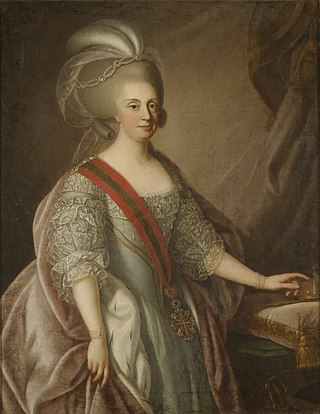
DonaMaria I was Queen of Portugal from 24 February 1777 until her death in 1816. Known as Maria the Pious in Portugal and Maria the Mad in Brazil, she was the first undisputed queen regnant of Portugal and the first monarch of Brazil.

Dona Maria II "the Educator" or "the Good Mother", was Queen of Portugal from 1826 to 1828, and again from 1834 to 1853. Her supporters considered her to be the rightful queen also during the period between her two reigns.

DomMiguel I, nicknamed "the Absolutist", "the Traditionalist" and "the Usurper", was the King of Portugal between 1828 and 1834. He was the seventh child and third son of King John VI and Queen Carlota Joaquina.
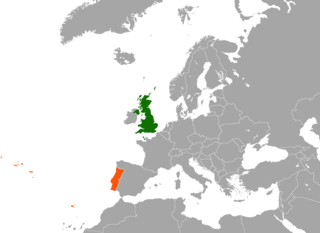
The Anglo-Portuguese Alliance is the oldest alliance that is still in force by political bilateral agreement. It was established by the Treaty of Windsor in 1386, between the Kingdom of England and the Kingdom of Portugal, though the countries were previously allied via the Anglo-Portuguese Treaty of 1373.
King Philip may refer to

A king cake, also known as a three kings cake, is a cake associated in many countries with Epiphany, the celebration of the Twelfth Night after Christmas. Its form and ingredients are variable, but in most cases a fève such as a figurine, often said to represent the Christ Child, is hidden inside. After the cake is cut, whoever gets the fève wins a prize. Modern fèves can be made of other materials, and can represent various objects and people.
Joseph Nasi, known in Portuguese as João Miques, was a Portuguese Sephardi diplomat and administrator, member of the House of Mendes/Benveniste, nephew of Dona Gracia Mendes Nasi, and an influential figure in the Ottoman Empire during the rules of both Sultan Suleiman I and his son Selim II. He was a great benefactor of the Jewish people.

The Merina people formerly called Amboalambo are the largest ethnic group in Madagascar. They are the "highlander" Malagasy ethnic group of the African island and one of the country's eighteen official ethnic groups. Their origins are mixed, predominantly with Austronesians arriving before the 5th century AD with Bantu Africans resulting in a core population known as Vazimba, later by large number of Javanese and a minority of Arabs, Indians and Europeans. They speak the Merina dialect of the official Malagasy language of Madagascar.
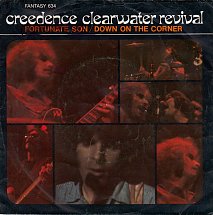
"Fortunate Son" is a song by the American rock band Creedence Clearwater Revival, released on the band's fourth studio album, Willy and the Poor Boys in October 1969. It was previously released as a single, together with "Down on the Corner", in September 1969. It soon became a Vietnam anti-war movement anthem and an expressive symbol of the counterculture's opposition to U.S. military involvement in the Vietnam War and solidarity with the soldiers fighting it. The song has been featured extensively in pop culture depictions of the Vietnam War and the anti-war movement.
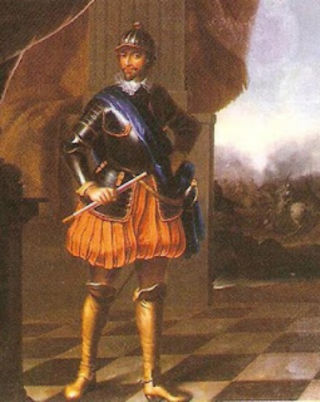
Dom Fernando II of Braganza was the 3rd Duke of Braganza and the 1st Duke of Guimarães, among other titles. He is known for being executed for treason against the King.

Philip, also Phillip, is a male name, derived from the Greek Φίλιππος, from a compound of φίλος and ἵππος. Prominent Philips who popularized the name include kings of Macedonia and one of the apostles of early Christianity.
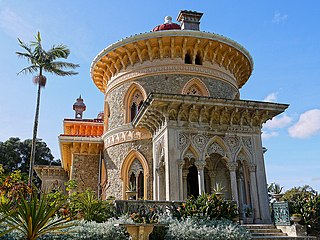
The Portuguese Riviera is a term used in the tourist industry for the affluent coastal region to the west of Lisbon, Portugal, centered on the coastal municipalities of Cascais, Oeiras and Sintra. It is coterminous with the Estoril Coast and occasionally known as the Costa do Sol. Portuguese themselves do not use this expression.